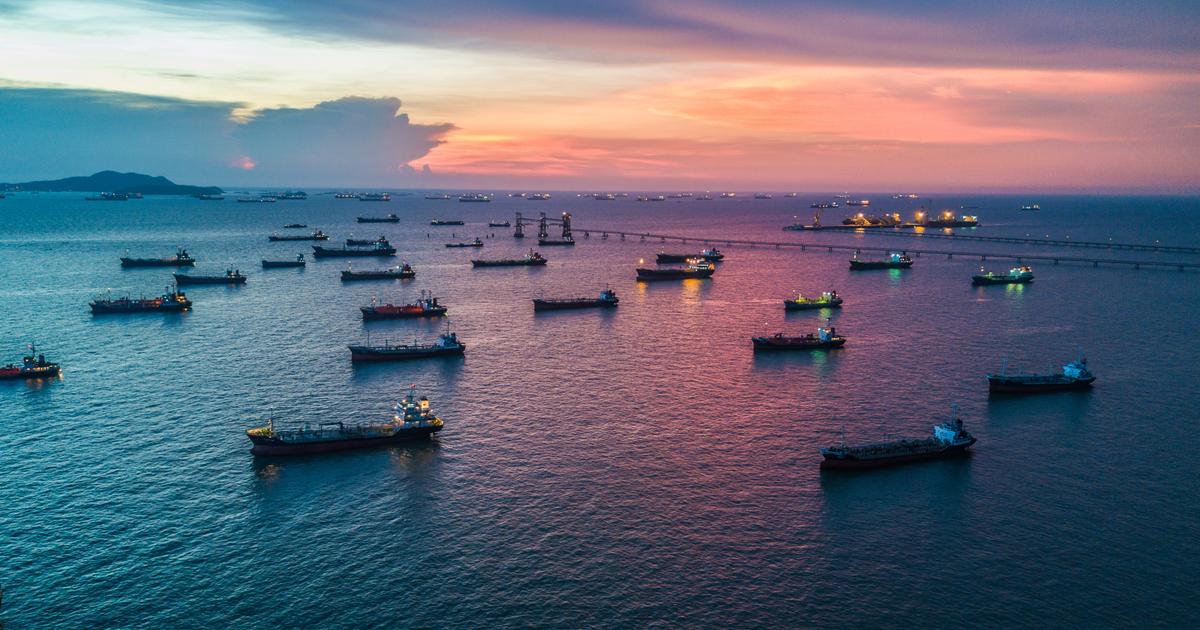Enlarge image
End in sight:
The lockdown ends this week in Shanghai - and with it the time when passers-by in bathrobes walk through the main shopping district
Photo: ALY SONG / REUTERS
The turmoil is back in the markets.
At the beginning of the week, the price of oil rose to its highest level in two months - the price of the commodity is now back to the level it was shortly after the start of the attack on Ukraine.
The price of the North Sea variety Brent rose to well over 120 US dollars per barrel on Monday. That was around 17 dollars more than in the middle of the month.
One of the price drivers is the agreement on an oil embargo with restrictions by the EU states against Russia - but there are now other concerns.
Concerns over supply constraints dominated the oil market in March, the last time Brent broke the $120 mark.
Russia, as one of the most important suppliers, threatened to fail, although there was no explicit embargo on Russian oil at the time.
International commodity traders sanctioned themselves and avoided imports from the country, while OPEC+ producing countries postponed expansion of production.
With the release of reserves, prices should be stabilized in the short term.
Now fears of an oil shortage are giving oil prices another boost.
It is still unclear to what extent the EU sanctions against Russia will affect the market.
But it is already clear that demand will increase sharply.
The main price drivers are news from China.
The world's second largest economy is easing restrictions to combat the pandemic.
From the beginning of June, the lockdown in the economic metropolis of Shanghai will end after two months, and companies and closed factories will be allowed to resume production.
China's authorities also said the Covid outbreak in the capital, Beijing, is under control.
This should have a short-term impact on global oil demand.
China is the world's largest importer of crude oil.
President
Xi Jinping
's (68) adherence to his zero-Covid policy at all costs had weighed heavily on the Chinese economy and its trading partners and dampened global energy demand.
According to estimates by the bank Standard Chartered, China's oil demand fell by 1.1 million barrels a day in April - about one percent of global demand.
When the economy and private consumption pick up again, these quantities are likely to be needed on the market again in the near future.
The comeback in China comes at a time when demand is also noticeably increasing in parts of the rest of the world.
In the USA, the "summer driving season" began at the weekend, the travel season with traditionally high fuel consumption;
In addition, there were surprisingly strong signals for the US domestic economy.
Accordingly, gasoline prices in the USA climbed to record levels.
And in Germany, too, fuel prices are still at a high level and often rose more than the price of crude oil.
Scarce refinery capacities are driving up the price of fuel
Saudi Arabia's energy minister blames other factors for the currently high fuel prices.
According to
Prince Abdulaziz bin Salman
(62), the soaring is not due to a global oil shortage - but to a lack of refineries.
There is simply not enough refinery capacity worldwide to produce gasoline and diesel, he said recently.
During the corona pandemic, some operators had permanently shut down or converted their refineries due to low profitability, some announced closures are still pending.
In Germany, for example, the Shell group had announced that it would stop processing crude oil in its refinery in Wesseling by 2025.
Globally, global refining capacity fell by a net 410,000 barrels per day in 2020 and a further 50,000 barrels per day in 2021, according to analysis by S&P Global.
According to Bin Salman, the US and Europe are particularly affected by refinery closures - the two world regions that have massively reduced their oil imports from Russia since the Ukraine war.
In the USA, President
Joe Biden
(79) is now trying by all means to get the high fuel prices under control before the congressional elections in November;
Most recently, according to Bloomberg, he even asked about the restarting of closed refineries.
And then there is the third factor, alongside the demand boom and tight refinery capacities: Russia.
It is still unclear what consequences the EU countries' embargo on Russian oil supplies will have on the global markets.
In 2020, the EU countries still imported around a quarter of their total 440 million tons of crude oil from Russia;
however, the individual governments had recently attempted to reduce their dependency.
At the special EU summit, after weeks of dispute, the states now agreed on a compromise proposal from the EU Commission.
This prohibits the import of oil delivered by ship from Russia - around two thirds of the imported quantity.
Pipeline shipments are being suspended under pressure from Hungary's President
Viktor Orbán
(58) continue to be possible for the time being.
Hungary can continue to get oil from Russia via the huge Druzhba pipeline.
Overall, this will increase demand for alternative oil on the world market.
Relief from the other oil-producing countries is unlikely in the short term.
The OPEC+ countries, which include Russia, are also meeting this week.
However, the alliance has so far resisted US calls to boost production beyond long-planned incremental increases.
For the time being, the Round is expected to stick to that plan.
dri with news agencies













